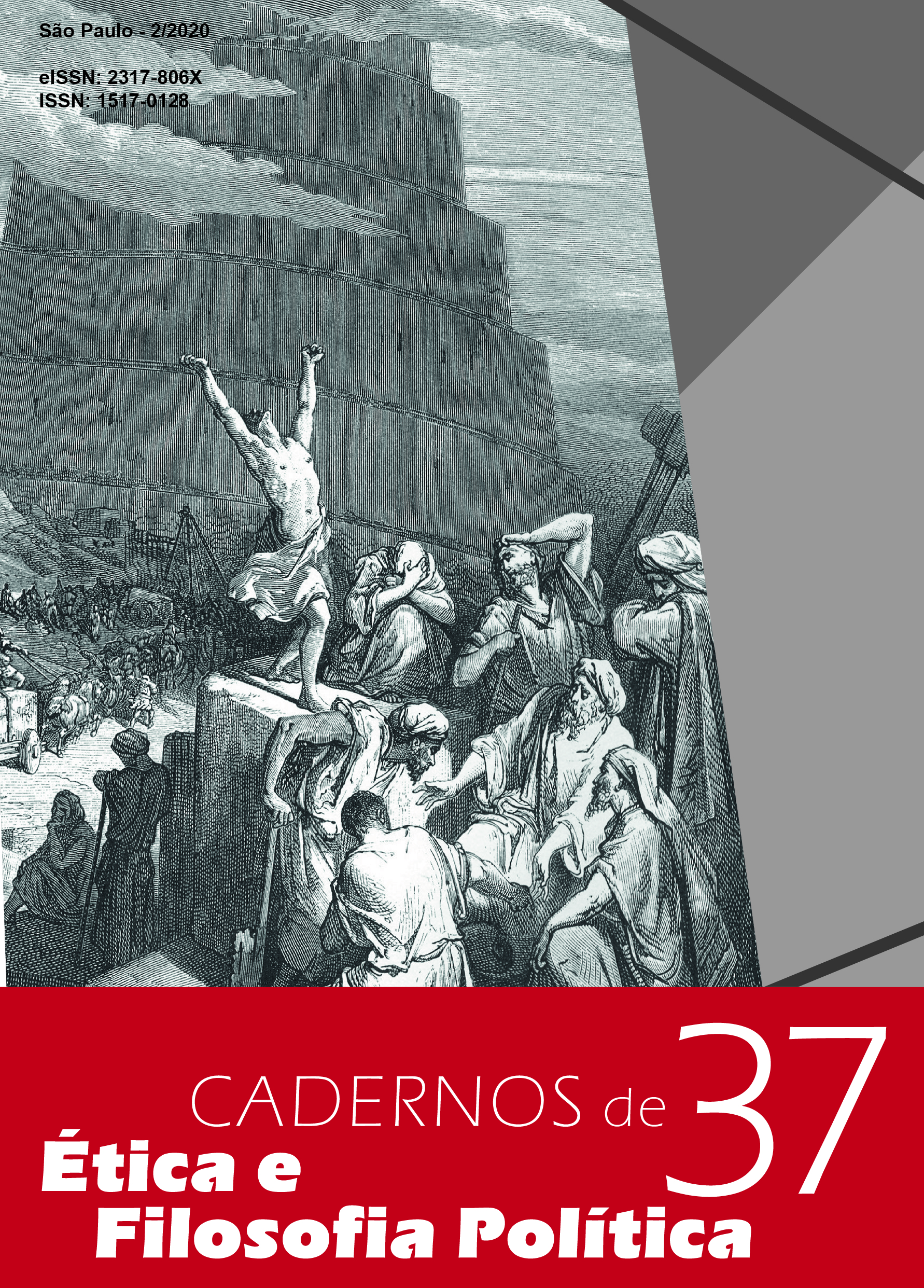The Influence of Nominalism on Hume’s Conceptions of Causality and Justice
DOI:
https://doi.org/10.11606/issn.1517-0128.v2i37p89-103Keywords:
Hume , metaphysics , epistemology , causality , justiceAbstract
The article intends to present the relationship between the notions of causality and justice in Hume, seeking to show how both are based on custom. To this end, we will briefly analyze the possibility of reading nominalism as an ontological background to some of Hume’s theses, especially concerning the weight given to sensitive knowledge and the theory of imagination. Under this horizon, custom will appear as a key piece to understand the notion of cause. Finally, we will examine his theory of social relations that understands justice as an artificial virtue. The article will also show the existence of an Aristotelian framework matrix regarding these two themes as well as a content that we will risk to describe as “inverted Platonism”.
Downloads
References
ARISTÓTELES. Ética Nicomáquea; Ética Eudémica. Introducción de Emilio Lledó Íñigo. Traducción y notas de Julio Pallí Bonet. Madrid: Gredos, 1985. v. 89.
ARISTÓTELES. Tratados de Lógica (Órganon): Categorías; Tópicos; Sobre las refutaciones sofísticas. Introducción, traducción y notas Miguel Candel Sanmartín. Madrid: Gredos, 2000. v.1.
ARMSTRONG, D. M. Nominalism and Realism: Universals and Scientific Realism. London: Cambridge University Press, 1978.
CHARLES, Sébastien; SMITH, Plínio Junqueira. Academic Skepticism in the Development of Early Modern Philosophy. Cham: Springer, 2017. (International Archives of The History of Ideas, 221)
COURTENAY, William J. Ockham and ockhamism: studies in the dissemination and impact of his thought. Boston: Brill, 2008. (Studien und texte zur geistesgeschichte des mittelalters, 99)
DANFORD, John W. David Hume and the Problem of Reason Recovering Human Sciences. London: Yale University Press, 1990.
FORTUNY, Francisco José. “Introducción al De successivis y al Prologus de la Expositio”. In: OCKHAM, Guillermo de. Exposición de los ocho libros sobre la Física (Prólogo); Los Sucesivos. Barcelona: Orbis, 1986.
FREYDBERG, Bernard. David Hume: platonic philosopher, continental ancestor. New York: Suny, 2012.
GILSON, Etienne. Being and Some Philosophers. 2 ed. Toronto: Pontifical Institute of Medieval Studies, 1952.
GOSSELIN, Mia. Nominalism and Contemporary Nominalism: Ontological and Epistemological Implications of the work of W.V.O. Quine and of N. Goodman. London: Kluwer Academic Publishers, 1990.
HILL, Benjamin; LAGERLUND, Henrik. Routledge Companion to Sixteenth-Century Philosophy. London: Routledge, 2017.
HUME, David. Investigações sobre o entendimento humano e sobre os princípios da moral. Tradução de José Oscar de Almeida Marques. São Paulo: UNESP, 2004. [IEM]
HUME, David. Tratado da natureza humana: uma tentativa de introduzir o método experimental de raciocínio nos assuntos morais. Tradução de Débora Danowski. 2 ed. São Paulo: Unesp, 2009.
LAGARDE, Georges de. La Naissance de l’esprit laïque au déclin du Moyen Age. Louvain; Paris: E. Nauwelaerts: Beatrice-Nauwelaerts, 1946. v.6.
LIMONGI, Maria Isabel. “Maquiavel e Hume sobre a natureza das leis e seus fundamentos sociais”. In: Kriterion. Belo Horizonte, n.140, Ago./2018, pp. 571-589.
MACNABB, D. G. C. David Hume: His Theory of Knowledge and Morality. New York: Hutchinson's University Library, 1951.
MAURER, Armand. The Philosophy of William of Ockham in the light of its principles. Toronto: Pims, 1999.
MCGRADE, Athur Stephen. The Political Thought of William of Ockham: Personal and Institutional Principles. Cambridge: Cambridge University Press, 2002.
NOONAN, Harold W. Routledge Philosophy Guidebook to Hume: On Knowledge. New York, Routledge, 1999.
OCCAM, Guillermo de. Tratado sobre los principios de teología. Traducción, prólogo y notas de Luis Farre. Buenos Aires: Aguilar, 1972.
OCKHAM, William of. Philosophical Writings: A Selection. Translated, with an introduction, by Philotheus Boehner, O.F.M. London: Bobbs-Merrill, 1964.
OCKHAM, William of. “Scriptum in Librum Primum Sententiarum: Ordinatio (Dist. XIX-XLVIII)”. In: OCKHAM, Guillelmi de. Opera Philosophica et Theologica: Opera Theologica. New York: The Franciscan Institute, 2000. v. 4.
OCKHAM, William of. “Quodlibeta Septem”. In: OCKHAM, Guillelmi de. Opera Philosophica et Theologica: Opera Theologica. New York: The Franciscan Institute, 1980. v. 9.
OESTERLE J. T. Aristotle On Interpretation: Commentary by St. Thomas and Cajetan. Translated from the Latin With an Introduction by Jean T. Oesterle. Milwaukee: Marquette University Press, 1962.
PANACCIO, Claude. “Semantics and Mental Language”. In: SPADE, Paul Vicent (Ed.). The Cambridge Companion to Ockham. Cambridge: Cambridge University Press, 1999, pp. 53-75.
PLATÃO. A República. Tradução de Carlos Alberto Nunes. 3 ed. Belém: EDUFPA, 2000.
ROCKNAK, Stefanie. Imagined Causes: Hume’s Conception of Objects. London: Springer, 2013.
SHOGIMEN, Takashi. Ockham and Political Discourse in the Late Middle Ages. Cambridge: Cambridge University Press, 2007.
Downloads
Published
Issue
Section
License
Copyright (c) 2020 Ivo Fernando da Costa

This work is licensed under a Creative Commons Attribution-ShareAlike 4.0 International License.


